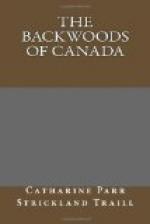We have a great variety of curious orchises, some brown and yellow, others pale flesh-coloured, striped with crimson. There is one species grows to the height of two feet, bearing long spikes of pale purple flowers; a white one with most fragrant smell, and a delicate pink one with round head of blossoms, finely fringed like the water-pinks that grow in our marshes; this is a very pretty flower, and grows in the beaver meadows.
Last autumn I observed in the pine-wood near us a very curious plant; it came up with naked brown stems, branching off like some miniature tree; the stalks of this plant were brown, slightly freckled and beset with little knobs. I watched the progress of maturity in this strange plant with some degree of interest, towards the latter end of October; the little knobs, which consisted of two angular hard cases, not unlike, when fully opened, to a boat in shape, burst asunder and displayed a pale straw-coloured chaffy substance that resembled fine saw-dust: these must have been the anthers, but they bore more resemblance to seeds; this singular flower would have borne examination with a microscope. One peculiarity that I observed, was, that on pulling up a plant with its roots, I found the blossoms open under ground, springing up from the lowest part of the flower-stems, and just as far advanced to maturity as those that grew on the upper stalks, excepting that they were somewhat blanched, from being covered up from the air. I can find no description of this plant, nor any person but myself seems to have taken notice of it. The specimen I had on being dried became so brittle that it fell to pieces.
I have promised to collect some of the most singular of our native flowers for one of the Professors of Botany in the Edinburgh University.
We have a very handsome plant that bears the closest affinity to our potatoe in its floral construction; it grows to the height of two or three feet in favourable situations, and sends up many branches; the blossoms are large, purely white, freckled near the bottom of the corolla with brownish yellow spots; the corolla is undivided: this is evidently the same plant as the cultivated potatoe, though it does not appear to form apples at the root. The fruit is very handsome, eggshaped, of a beautiful apricot colour when ripe, and of a shining tempting appearance; the smell, however, betrays its poisonous nature: on opening one of the fruits you find it consists of a soft pulp filled with shining black seeds. The plant continues in blossom from June till the first frosts wither the leaves; it is far less coarse than the potatoe; the flower, when full blown, is about the size of a half crown, and quite flat; I think it is what you call salver-shaped: it delights in light loamy soil, growing on the upturned roots of fallen trees, where the ground is inclined to be sandy. I have never seen this plant elsewhere than on our own fallow.




